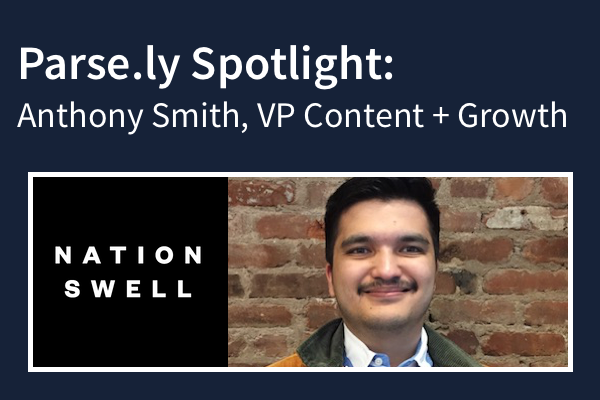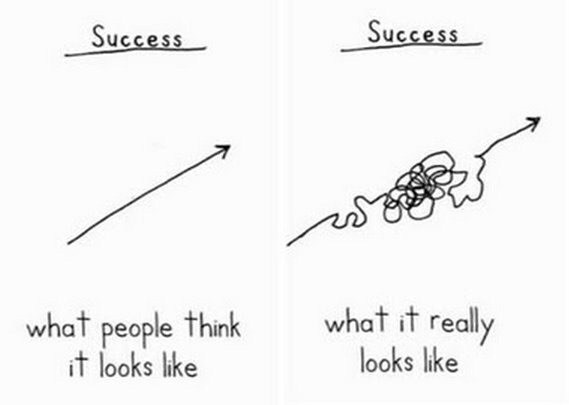From informing to advocating: Spotlight on Anthony Smith from NationSwell

Do the careers we expect to have match the ones we end up? Most people would say no. Of course, the path we take on along the way is where we spend most of our lives. Shouldn’t that journey be an interesting one? At Parse.ly, we’re highlighting people and companies in content who have interesting paths to success in our “Spotlight” series.

Take Anthony Smith, now VP of Content and Growth at NationSwell, which he describes as “the coolest company you’ve never heard of.” Smith’s job is to use content to make sure audiences have heard of them. But where did he start? While the adage goes that “Nobody gets into journalism to make money,” Smith bucked that trend. He got his first reporting job as a way to pay the bills, after writing and producing a play that made him $3.
“Anyone who wrote an essay in high school thinks they could do reporting,” Smith says about what people don’t realize about how journalism works. Years of being in a newsroom have made him empathic to the rigor it takes to report a story correctly. He’s also no stranger to the emotional toll reporting extracts.
Today, the Smith has moved on from the drumbeat pace of day-to-day reporting. At NationSwell, he focuses on how storytelling can champion solutions to problems. But he leans on skills he learned in newsrooms, including the importance of supporting the emotional side of investigative journalists he manages and building connections with local communities to impact change in America. Here’s his journey.
A food critic who saw the intersection of stories and their potential impact
Smith took his first journalism job as a food critic in Brooklyn. Pre-Smorgasburg, it happened right around when food started to become more than “just something that tastes good” to a “lifestyle.” He saw people buying food so they could post a picture on Instagram and then throwing it away. He found this behavior fascinating.
However, the structure of the media organization meant that he couldn’t cover the true scope of the topics he saw. “There’s so much that happens at restaurants,” he said. The rise of delivery platforms pitting kitchen staff against delivery men, or the economics of where food product came from all connected to the food people ate. But food reporting stayed bucketed, away from the “more serious” business reporting.
“That happens a lot with Style sections,” Smith added, “because older media companies are organized in a certain way.” He felt this structure meant the audience missed out on interesting stories. He also started to notice that the voices telling these stories tended to come from a single perspective: older, white men. While he didn’t blame them for seeing stories a certain way, he knew that they missed essential storylines. He knew the experiences of women, immigrants, people of color, or LGBTQ people weren’t being reflected in these story selections.
An editor who used data to get the story
Later, Smith went to work for Mic.com. In his role as Growth Editor he used analytics data to find audiences for Mic’s stories on Facebook. This data, along a newer organization unencumbered by traditional beats and reporting structure, allowed Smith to help Mic.com uncover “stories, beats, narratives, and topics that had a higher likelihood of virality than others.”
Using data, Smith set up what he coined “a CrowdTangle for the alt-right areas of the internet.” Smith and his co-reporter, Cooper Fleishman, uncovered the meaning of alt-right and neo-nazi groups’ use of “echos” around people’s names to indicate Jewish heritage and target them for harassment online, for example (((Carr))). Today, many people use these same symbols to express pride in their Jewish heritage or support the Jewish community.
Another time, Smith uncovered a credit card company called “Magnisis” that had a suspicious number of bot reviews, though not enough information was available to justify a story about it. Later, when a well-timed bout of food-poisoning meant Smith was up at an odd-hour on Twitter he noticed complaints starting to come in about the conditions of a festival in the Bahamas. He realized the festival shared a founder with the credit card company he had wondered about months earlier. His resulting story and follow-up about the now well-known Fyre Festival revealed how much the organizers knew ahead of time about the lack of amenities on the island.
A vice president using storytelling to get audiences to advocate for change

Even though he saw success using data to both find stories and guide reporting, Smith doesn’t let numbers dictate everything. Instead, he sees them as a way to make better decisions when you have multiple options to consider. “It’s important to remember that if you’re doing one thing, you’re not doing another,” he said.
The stories the NationSwell content team covers don’t necessarily follow the breaking news cycle. This means he’s free from the intense time-pressure of covering the latest news out of the White House. It also means those decisions on which stories to cover become even more critical. Small successes, backed by numbers, help him build a case for more reporting. With a small team, he wants to place bets that he knows will grow their audience. He wants to make the impact they set out to achieve.
He also uses data as part of story “post-mortems” to look at what did and didn’t go well. Smith also checks in on how the reporter feels. Did the reporter expect the response they got? Do they need any help emotionally with any aspect of it? “There are times when we have to check in with one and other.”
Smith joined NationSwell because he wanted to move out of the realm of simply “informing” and into “advocating” through content. In addition to producing content online, which is not currently monetized, NationSwell has a studio available for corporate brands looking to get involved with social issues. The company also organizes a council where members pay an annual membership contribution.
As the landscape in digital media continues to shift, we’ll continue to spotlight stories like Smith’s. His career and NationSwell’s model provide perspective on what content can do for companies looking to make an impact.
Anthony Smith was nominated for this story and an accompanying Lunch and Learn dialogue in our New York City office by his colleague Caitlin Duffy, a member of our Content Analytics Advisory Panel. We take applications and nominations for the panel on an ongoing basis.